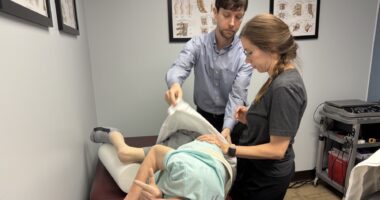Children with SMA express good quality of life in small study

Children with spinal muscular atrophy (SMA), even those with substantial physical disability, tend to report that their quality of life is similar to other children their age, a small study from Germany reports.
“The results from this pilot study show that German children with SMA, despite significant physical disability, have surprisingly good HRQoL [health-related quality of life],” the scientists wrote.
The study, “Self-Reported Health-Related Quality of Life of Children with Spinal Muscular Atrophy: Preliminary Insights from a Nationwide Patient Registry in Germany,” was published in the Journal of Neuromuscular Diseases.
Most were being treated with Spinraza or Evrysdi
Living with a chronic illness like SMA can take a toll on a person’s quality of life, and studies of patients’ life quality are fairly routine. But few have looked into children’s views of their life quality with SMA, particularly since the recent introduction of disease-modifying and more effective SMA treatments, the scientists noted.
A team in Germany surveyed 17 children and teenagers with SMA, ages 5 through 16. Three children had SMA type 1, eight had SMA type 2, and six SMA type 3.
All but two of the children were actively taking disease-modifying therapies, specifically Spinraza (nusinersen) or Evrysdi (risdiplam); six could walk and seven others could sit independently.
The children each completed a battery of age-appropriate standardized tests of health-related quality of life.
“The objective of this pilot study was to estimate and describe self-reported HRQoL in a contemporary cohort of German children with SMA,” the scientists wrote.
Ten of the children, ages 8 and older, completed a questionnaire called the KIDSCREEN-27. Results showed that, for most domains assessed by this questionnaire, the children reported scores in normal or even above-normal ranges. The only exception was on the “physical well-being” domain, with patients who couldn’t sit independently, in particular, reporting poorer-than-typical scores.
A ‘subjective quality of life similar to that of other children’
“Surprisingly, self-reported estimates from the KIDSCREEN-27 instrument show that our sample of children with SMA has good overall HRQoL … Aside the physical disability, these results indicate that most patients in our cohort have subjective HRQoL similar to that of other children,” the researchers wrote.
Seven children younger than age 8 were given a questionnaire called KINDL, which they also completed on their own. Here, patients who couldn’t walk had comparable life quality to normative values for the general population, but patients who could walk tended to report poorer-than-typical life quality scores.
“These differences may be due to different coping mechanisms,” the researchers noted. “SMA children with inferior motor skills are more confident with their disability, while SMA children with better motor function (yet inferior to that of healthy children) have more acceptance problems.”
Scores on measures of health utility, completed by all of the children, generally showed better outcomes among those with less physical impairment. For example, children who could walk generally scored better than those who could not sit independently. These results indicate that many children with SMA live in a health state that most people in the general population would not want for themselves, the researchers said — making the finding of a mostly normal life quality all the more striking.
The scientists stressed that this was a small study conducted in one country, so the findings may not be applicable for children with SMA in other parts of the world and more research is needed to validate the findings.
“Our preliminary findings contribute to the understanding of HRQoL in pediatric patients with SMA and should be helpful to inform the design of future studies in this patient population,” the team concluded.
The post Children with SMA express good quality of life in small study appeared first on SMA News Today.


